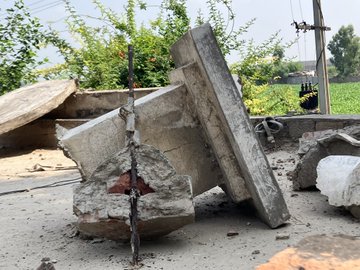In a heart-wrenching assault on the Ahmadi community’s right to worship, police in Pakistan’s Punjab province have allegedly demolished the minarets of a 40-year-old Ahmadi worship place in Okara, Depalpur, roughly 130 kilometers from Lahore. The shocking incident has left the Ahmadi community, already besieged by decades of persecution, grappling with yet another devastating blow.
Jamaat-e-Ahmadiyya Pakistan (JAP) official Amir Mahmood described the anguish of the event on Monday. “Under the supervision of the DSP, two police mobiles arrived from Depalpur Police Station, cordoned off the area, and demolished the minarets of our worship place. They even went so far as to remove the sacred words inscribed on our building, using cement as if to erase our faith,” Mahmood said with deep sorrow. The worship place, a cornerstone of the community’s faith, had stood for nearly four decades before being reduced to rubble.
This act comes despite a ruling from Justice Tariq Saleem Sheikh of the Lahore High Court last year, which made it clear that Ahmadi worship places built before 1984 need no amendments or modifications. But even the protection of the law could not shield the Ahmadi community from the relentless waves of intolerance.
The police, in a chilling justification, stated that they acted only after local Ahmadis refused to comply with an order to demolish the minarets themselves. “We received complaints that the minarets resembled those of Muslim mosques,” a police official said, claiming they had “no choice” but to act. Yet to the Ahmadis, this was no mere demolition—it was an act of spiritual desecration, an attack on their very identity.
The Ahmadi community has long been targeted in Pakistan for their religious beliefs. Though Ahmadis consider themselves Muslims, Pakistan’s Parliament declared them non-Muslims in 1974. A decade later, they were further banned from practicing Islam publicly, and prohibited from constructing minarets, domes, or using Islamic symbols. The persecution has only intensified, with last year alone witnessing at least 42 Ahmadi worship places attacked.
The far-right Tehreek-e-Labbaik Pakistan (TLP) has often incited such violence, claiming that Ahmadi worship places mimic Muslim mosques. Their inflammatory rhetoric, combined with pressure from extremists, has led to both vigilante and state-backed attacks on Ahmadi sacred sites.
For the Ahmadi community, this recent demolition is more than just the destruction of a building—it is the erasure of their faith, their history, and their right to exist. As the dust settles on the debris, the pain remains, a stark reminder of the ongoing struggle for dignity and freedom in a nation that continues to deny them both.
